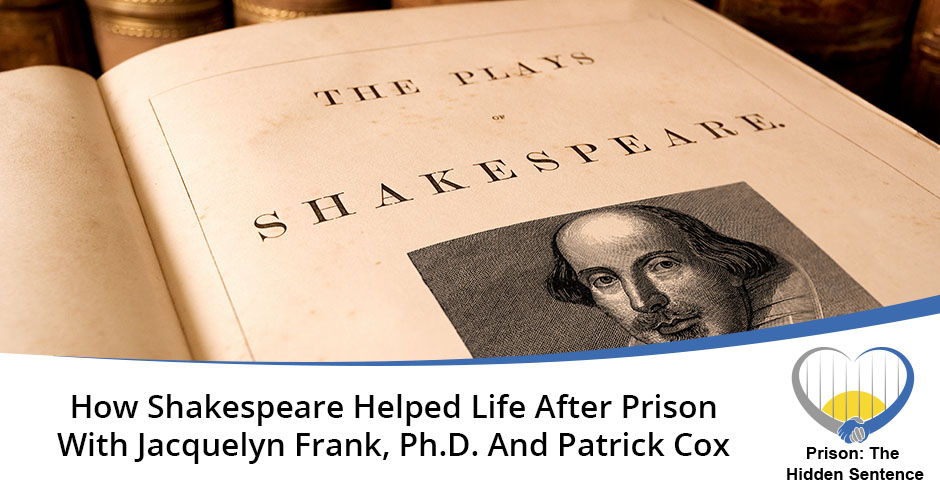
Life after prison is challenging for both the incarcerated and their family. Julia Lazareck welcomes Jacquelyn Frank, Ph.D., who walked into a prison to help with a Shakespeare project. There she met Patrick Cox, one of the incarcerated who participated in the project. Join in the conversation as Patrick and Dr. Jacquelyn discuss the value of programs, the prison journey, and life after. Patrick shares how the program helped him and what life has been like during the first six months out of prison. They will take you on a journey that everyone needs to hear. Dive in!
—
Listen to the podcast here
How Shakespeare Helped Life After Prison With Jacquelyn Frank, Ph.D. And Patrick Cox
I’m here with Jacquelyn Frank, PhD, and Patrick Cox. Jacqueline met Patrick many years ago when she came to the Wabash Valley Correctional Facility in Indiana to help out with a theater group. She also learned about aging in prison. She incorporated this knowledge into her curriculum at the university where she teaches at.
Patrick was incarcerated as a young man at eighteen years old and spent 26 years in prison. They continue their collaboration and friendship after Patrick’s release. They’re going to take us on their journey that everyone needs to hear about. Dr. Frank, thank you so much for being here. Patrick, thank you for being here. Dr. Frank, could you provide background on the start of your journey and how you met Patrick?
I’d be happy to. I met Patrick at the very beginning of what I call my prison journey. I had always been a little bit interested in the prison environment and working with people who are incarcerated. I had a colleague friend at Indiana State University who was facilitating a theater group at Wabash Valley Correctional Facility in Indiana. She invited me to go along with her to meet the group of men she works with, and ask them some questions about the aging process in prison because I’m a gerontologist.
I went there and I think I met Patrick the first day I was there. He was part of that theater group. I was very much enthralled by the whole process of the theater group, but also with the group of men that my colleague was working with. At that time, it was the Shakespeare theater group. What they were doing, how they were processing all of this, and the collaborative efforts felt like something I wanted to be involved in, so I continued to volunteer with that. When she left, I took over the theater group at the prison.
I then started a longitudinal research study that Patrick was part of to better understand people who had long sentences and how they were processing their time in prison, their thoughts and plans for release looking forward. At that time, Patrick has a life without parole. I had my hands on a lot of different things and brought some of my graduate students several times to the prison. I even created a class where we collaborated with a group of prisoners from Wabash, including Patrick. We had worked on some family relationship issues for an entire day there. It’s a lot of different types of things, many of which Patrick was involved in until he transferred and left. I left and switched over to working in prisons in Illinois, but we maintained contact and a long-distance collaboration as well.
That’s so interesting, working with people that were incarcerated and bringing them this knowledge and this outlet. Patrick, what was it like for you when you heard about this program? Why did you want to get involved?
To be honest, I started off with Dr. Bates. That was her colleague that she spoke of. Upon graduating from ISU, while I was incarcerated. She offered this Shakespeare group for us to be part of. That was where we started this endeavor. It gave me an outlet. Being in there and not having any real outlets. Our only outlet is communication with the outside world and it’s so limited. To have this outlet meant a lot to a lot of us.
When we met Jackie, it was perfect timing because the other volunteer that was coming in and working with us quits. Jackie jumped right in and took over where she left off and it was awesome. We had a lot of other programs that stemmed from that, and a lot of others that were involved in it. It was very stimulating for our minds. It kept us sharp and it was a great experience.
The most important role that any family members or loved ones play with their incarcerated loved ones is to be active. Share on XI would like to add to what Patrick was saying. Looking back over the last several years and my work in what now has been about fifteen different prisons in Illinois and Indiana, and some in other states, I have to give a hat off to Wabash Valley Correctional Facility. It’s a maximum-security facility, but they were perhaps the most flexible place I have been in terms of being very open to creative programming, to new ideas, to allow me and the men who were incarcerated space and time to do some of these things. I was a little spoiled there because moving on from there, there has not been a place that’s been that offering opportunities for either me or the men and women that I’ve worked with.
It’s so wonderful. It’s unfortunate, especially during COVID, that a lot of the programs have stopped. Patrick, is there anything that you can share with the families out there like the benefits of this or even things that families can do? I know they can’t go into the prisons and do these great programs like what you went through with Jackie, but maybe a suggestion to the families too.
The most important role that any family member or loved ones could play with their incarcerated loved ones is to try to be always in contact. I know it’s hard to find time to sit down and write letters or whatever, but as often as you can, try to be active in their lives because it means so much. Any contact you have with the outside world means so much. That’s what helped me through that 26 years because my family was able to come and visit me when they were able to, and me being able to call home and hear their voices. Even though a lot of times, it’s hard on both parties but it’s still the same. It helps to keep you going.
It keeps you connected. Talking about the theater, that must have been an outlet while you were incarcerated. How did that help you?
It was. It gave me a way to express myself in a positive manner. We had a lot of different things. When we started off with a Shakespeare group, it was interesting. It got us all hooked in there, but when Jackie came in, I had told her that we wanted to do our own play. We wanted to write our own play.
That’s what they did from thereon. They wrote their own plays and we performed them. Even in other projects as well, Patrick was a collaborator at least for a period of time with two other incarcerated men to develop a program surrounding service-learning opportunities. Especially for a lot of men who had already been in 10, 11, 12 years, they wanted to give back or do service. How do you do that in a prison environment and work on facilitating those things?
You mentioned families often not being able to be involved. Again, hats off to Wabash Valley because in one of the programs that I did set up when my students came from the outside, they also invited the prisoner’s families to come that day. They had lunch and discussed some of these issues as a group. We’re getting some feedback from some of those parents after that opportunity after that day, “I’ve never gotten to see my son outside of the visiting room.” When we’re in a casual setting with a group of people talking, it seems so normal rather than the formality of the visiting room. It’s very sad that more opportunities are not out there like that.
I can say that there’s no way in the universe anything like that is happening in Illinois or has been allowed to happen, to find supportive administration who is at least going to be open to it. Security and safety are going to be their bottom line, but they’re open to ideas and stepping their toes into the water about how we can create better relationships between family members and those who are incarcerated, or how we can better involve them.

Shout out to the administration. Did you guys perform for families?
Yes. There were always two performances. The first performance would always be for our family members, any staff who wanted to go there, and the media that they’ve invited. The next performance would be for our peers that were incarcerated with us.
Have you ever thought about taking it outside of the prison?
I enjoyed it. I know that what I consider professional actors or actresses, I don’t know that I would fit in well with them. I think we did a good job being incarcerated, and for what we were limited to.
It comes from the heart. It’s all good.
Some of that feedback from some of the guys who were in the theater group over time is building more confidence speaking in front of people, and building more confidence in general. Not having had opportunities to do things like this, it’s a real sense of accomplishment. Some people think, “Theater, whatever.” Writing your own plays is a creative process. That’s building a sense of confidence in getting up in front of a group of people, and speaking and performing.
It was interesting because I received feedback on the experience that I hadn’t thought much about, and to be able to have family members come and see you do this. Wabash started allowing recording of the plays so that I would then go to the university and get the DVDs burned. These are not high quality but the families could then have the DVDs and have that piece of their child’s work.
I was wondering because they don’t have programs like that in the prisons now, especially after COVID. Could it be cool if the family could create their own play? They could come together somehow through email, texts, video, video conferencing, visits, however it is and create their own play.
Be relevant in the lives of your loved ones and make them feel relevant in yours. Share on XThat would be interesting.
That would be collaborative and something for the family to do because sometimes they don’t have something to talk about. I’m just throwing it out there. I’m always thinking of things for the whole family. We can talk about the prison family. We can talk about the person that’s incarcerated, the family on the outside, and things they can do together. If there are any families out there that want to create a play, let us know. That would be so cool and a video that we can put on the website. I have two questions, but I’m going to go to Patrick first. What are you doing now? How long have you been out? What was the transition like?
I’ve been out for a few months. It’s been a journey. Initially, it seemed like a lot of stuff was coming at me from every direction. After having been locked up for so long, I didn’t have a lot of experiences and Facebook blew my mind. Since then, I’ve deleted my Facebook account. Since I’ve been home, I’ve been trying to stay busy. I’ve been working and trying to find a better job. I got my license now, so things are starting to come together. The biggest thing is the medical stuff. As we spoke about, medical provider while you’re incarcerated is so poor. I injured myself years ago, I rolled my ankle playing basketball, all they would do is take an X-ray and say, “There are no broken bones.”
Now that I’ve been home, I got to see a real doctor. My doctor referred me to a foot doctor and after taking MRI, the podiatrist said that I had torn ligaments. Two of the main ligaments in my ankle have been torn. The stabilizer ligaments go on the outside of the ankle. They’ve grown back but there are a lot of scar tissues and they’re loose. I’m going to have surgery to repair that. I had to deal with the vascular surgeon because of the vein damage in my leg. Hopefully, they get it all straightened out, but that’s what I’ve been trying to do, get that taken care of and make sure I’m in the dentist. I am trying to get everything fixed that I couldn’t while I was incarcerated.
You’ve also been reconnecting with your family a lot. You’ve talked to me about, “I go visit my mom and see my brother,” and the social family stuff.
I’ve been able to take my mom to church. I sang in church. It’s on my mom’s Facebook page if you check it out, Jackie. She was thrilled about that. It’s being able to be part of their lives again because I try to be as relevant in their life as I can, and make them feel as relevant in mine. Doing so while you’re incarcerated is very hard. What I can do is call you and hope I catch you at a good time. That’s not always the case. Being out here, I see how busy life gets. Before, I thought, “Life is so busy? You can’t sit down and send me a little email real quick?” I never voiced that to my family but I thought that, but now that I’ve been out here, I’ve been able to spend time with them. It has been awesome.
I have a lovely girlfriend. She has helped me out so much with a lot of things with my adjustments. It’s been quite an experience. Now we got a dog. We rescued a dog. He was getting ready to be put down and we saved him. He’s awesome. Life has come at me from a lot of different directions and given me a lot of troubles, but I’ve tried to stay focused and stay on track. It has helped out. We’ll see.
What do you think would be the best advice you can give to somebody that is still incarcerated to prepare them for this?

I started working on my re-entry process at least a year and a half before I was set to be released. DOC offers re-entry classes and it’s supposed to be about a week long. They say they cover all this different stuff but to be honest with you, it’s very subpar. They are teaching you how to fill out an application. This is something that I already know but most people don’t even do applications on paper no more. It’s all electronic. You’re taking someone who’s been locked up for 26 years and had not been violating rules. Having a cell phone, I didn’t have any knowledge of any technical stuff or electronics or any of this stuff and you’re kicking me out the door.
Thank God that I wasn’t a rule violator a couple of times. I had a little bit of knowledge in this sense but ultimately, that’s the wrong way to look at it too. I feel like I have to live in there like I want to live when I get out here. I had to start changing my thought process and thinking about things in a different light because otherwise, if I get out and I still have a problem with authority and I still feel certain ways, then I’m going to continue to carry that with me. It’s going to cause me problems in the future.
My last question for Patrick is, when you came out of prison, what was the most fascinating thing? What helped you the most or something that when you came out, you’re like, “Wow.” This big change after 26 years and also what helped you acclimate.
To be honest, it was the simple things. Being able to go out there and watch the sunset or look up and see the stars. I remember so many times when I was incarcerated, I’d be out at night but you can’t see the stars because you got all these bright lights in your face. I thought to myself, “I can’t wait to get out and be able to see these stars on a clear night or be able to watch the sunset without looking through Concertina wire fencing.” Simple things like that were a big blessing for me. Something that came fast was Facebook. I wasn’t used to attention like that. Any females I was around had to act a certain way and I had to act a certain way.
When I got on Facebook and all these females started coming at me from all these different directions, it was overwhelming. I didn’t react properly because I was in a relationship. Because of that, that caused some issues with us. I was like, “It’s not that important. I’m going to delete that account and we’ll move forward.” We have and things have been good.
A lot of times, you have to try to make sure you keep yourself busy because if not, you’ll end up starting to get in trouble somewhere. The simple things in life are something you got to enjoy, walking out whenever you want, going to the refrigerator, opening the door and saying, “I can get anything I want in here.” Those are the little simple things that most people who’ve been out here take for granted for sure. It was a blessing for me.
What is the best thing that somebody on the outside can do for their family member when they first get released?
Be understanding. We all have different mental capacities. We have different upbringings and different experiences while incarcerated. You have to be understanding of the situation and the circumstances because if not, you might react poorly, which will cause you’re formerly incarcerated loved one to respond negatively. You don’t want to burn bridges between each other. You want to try to rekindle things and you want to try and grow closer. Be very patient and be very understanding of the situation. Try to set them up for success.
Do the best you can to set others up for success. Share on XI don’t mean give them a bunch of money and all that stuff. Know what stuff they’re going through. Know what their struggles are, and try to keep them away from those struggles. Try to do your best. Some people don’t do well around big crowds. I didn’t have an issue with it, but a lot of guys I spoke to have. Know that and try to keep them from those big crowds or whatever. Do the best you can to set them up for success.
It’s healing on both sides. Thank you for sharing that. Jackie, I wanted to ask you about any programs in the prisons now after COVID? Will something like this continue? Do you have any suggestions for administrators on what they can do?
Now that things are opening up more and more, there will be more opportunities. One area where a lot of programming is needed is health promotion. Having facilitated these workshops for chronic disease self-management and diabetes self-management, which I’m certified to facilitate, I have done these in a number of prisons. The value that the incarcerated men and women say that they get out of is a better understanding of how to try and manage some health and medical issues when they are on the inside.
Creative outlets are so necessary too. Some prisons in some settings are a little more open and flexible to it than others. For people like me who may be faculty or maybe volunteers, or may have an interest in working or volunteering on the inside, be positive, be persistent, be patient because those rules within the incarceration setting are always going to trump everything. If you’re enthusiastic about working with this population, then don’t give up. Talk to people who have experienced doing it. Talk to people who have been released about ideas, especially people like Patrick, who spent 26 years in.
Over that length of time, what did you see that’s missing, whether or not that’s something that in particular helps long-term prisoners or whether it helps anyone in the prison setting. If it’s purposeful programming that you can show the DOC how this benefits everyone. I think there are more opportunities for coming in and doing things. I’m optimistic now because things do seem to be opening up more, certainly in the State of Illinois. We’re seeing the doors are back open for programs and things like that.
I want to thank both of you for your time. I appreciate it. It’s going to help a lot of people. Also, for people who haven’t heard of programs like this, look at the relationship you guys have after prison, how you’re still supporting each other, and have established this friendship. When somebody is incarcerated, people need to realize there are people. Patrick is a person. He’s a good person. We don’t know why he was incarcerated or whatever happened there.
As a human being, he is a human being. He’s one of us. We want him to succeed. That’s why this is so important. That’s why we do shows like this. That’s why we’re thankful we have people like Jackie who are going into the prisons and providing these programs, and people like Patrick who are taking advantage of it to improve themselves. Now Patrick has been out of prison for months. It’s a learning process, but he’s thriving because he had the support. While he was incarcerated, he took advantage of the available programs, and now he even has a dog. He rescued a dog. It’s wonderful.
I’m so happy to have heard your story previously and for having you guys on the show. If anybody has any questions, you can reach out to us at Prison The Hidden Sentence. We’re available. If anybody wants to be on the show, has questions or wants to start a program. We will make sure that you are in contact with the right resources and do anything we can to keep these programs going in prisons because, as we can see, they help everybody. Thank you so much.
Thank you very much.
Thank you.
Important Links
About Jacquelyn Frank

Dr. Frank’s areas of focus include aging in place, residents’ perspectives, Alzheimer’s disease and dementia in prison. In 2002 she published The Paradox of Aging in Place in Assisted Living (Greenwood Press), which focused on the residents’ experiences living in two assisted living settings in the Chicagoland area. She has authored several other publications on assisted living and aging in place.
Dr. Frank has been researching different aspects of incarceration for over ten years (including aging in prison, teenagers incarcerated as adults, chronic disease self-management, and hospice care in prison.
Love the show? Subscribe, rate, review, and share!
Join the Prison: The Hidden Sentence Community today:

Leave a Reply